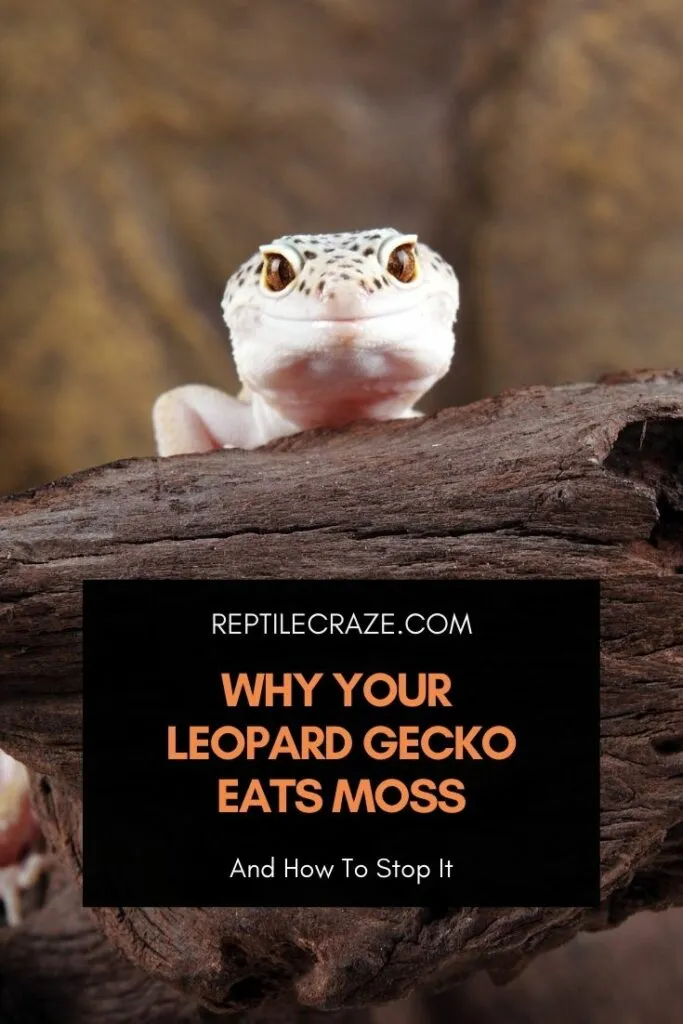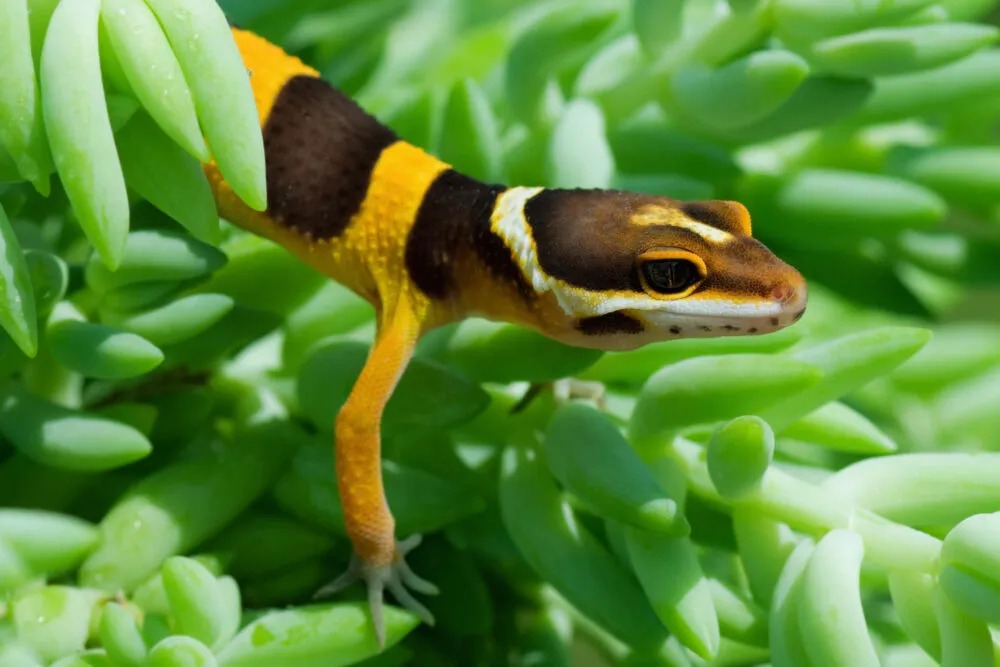
If your leopard gecko is eating something other than the insects you feed it, such as moss, you need to sit up and take notice as a leopard gecko’s diet influences its well-being to a large extent.
A leopard gecko eating moss is usually a sign of nutritional deficiency since moss has a high nutritional content. Also, leopard geckos with a high parasite load can eat moss if available. In some cases, a leopard gecko can accidentally ingest moss while eating insects or its own sheds.
Moss (mostly sphagnum moss) is a commonly used moist hide substrate. When a leopard gecko eats moss, it can cause impaction which can lead to severe complications. In this article, we will go through the reasons behind eating moss and the risks involved. We will also tell you what to do if your leo eats moss.
Table of Contents
Why does a leopard gecko eat moss?
A leopard gecko will eat moss in one of the below scenarios. If your leo is eating moss, find out which reason from the below is applicable.
1. The leopard gecko has nutritional deficiencies.
Moss is naturally high in nutritional content. If your leo isn’t getting enough nutrients through the feed, it might seek nourishment from moss.
Thus, it is recommended to feed your leo with gut-loaded insects (sometimes even) dusted with supplement powders. This will keep them healthy and they won’t look for nutrients elsewhere.
2. The leopard gecko has a heavy parasite load.
Leopard geckos with parasite burden are known to eat substrate (it is not known why they do that). Since sphagnum moss is a commonly used substrate in moist hides, leos with a parasitic infection are likely to eat it.
These leos will also eat other substrates present in their enclosure such as sand. So, watch out. Usually, a fecal test will reveal whether there is a parasite load.
3. The leopard gecko has accidentally ingested moss.
Leopard geckos are insectivores and feed on live insects. Sometimes, while they chase their prey, it is possible that they accidentally ingest some moss while eating the prey.
This can happen if the prey is in an area with some loose substrate. When the leo tries to gobble up the prey, some substrate can be accidentally ingested.
Also, leos eat the skin they shed. If they are near the moss substrate and are pulling at their sheds and eating it, they can ingest some moss. However, this eventuality is rare, though not impossible.

What are the risks of eating moss for a leopard gecko?
As mentioned above, the biggest risk of ingesting moss is that it can lead to impaction. Impaction is a condition where some indigestible material blocks the intestinal tract. If left untreated, it can lead to the entire digestive system collapsing. This can be a serious condition that can even lead to death.
Look for below signs to know whether your leo is impacted.
- Lack of appetite
- Reduced movement
- Abdominal swelling
- Vent prolapse
- Weight loss
- A dark spot on the underside of the abdomen
If you notice any of the above signs, you should immediately consult a vet! Do remember that younger leos are more susceptible to impaction because their digestive tracts are smaller than adults. Hence, you should be more watchful if you have a juvenile leo.
The other risk associated with eating moss is that it may indicate your leo has a nutritional deficiency. Calcium or vitamin deficiency can cause health problems in the leopard gecko. Hence, making sure they eat only gut-loaded insects is crucial.
Similarly, if the leo is eating substrate due to a parasite burden, getting a fecal test and treating the parasitic infection is necessary. Timely treatment can prevent complications.
How to know if a leopard gecko has ingested moss?
Some owners witness their pet leo eating moss. That makes it easy to know what they are up to and take corrective measures immediately.
The other telltale sign is to see undigested moss in their feces. If you come across any moss in the poop, you need to be on alert. Check signs for impaction and take measures to prevent moss ingestion.
What to do if a leo eats moss?
Saw your leo eat some moss? Don’t panic. Look for the below signs.
- Is your leo constipated? If your leo is passing stools, as usual, there is no immediate cause of worry. If you see moss in the stools, that’s normal, too. However, if it is constipated or looks uncomfortable, or is straining while passing stools, you need to be alert. Check for signs of impaction.
- Is your leo lethargic? Lethargy can be a sign of impaction. If you find that the leo isn’t moving too much, observe it to check for other unusual signs.
Apart from this, make sure it is well-hydrated. This will help it pass the undigested moss via stools.
If the leo has ingested some moss in a one-off incident, usually it is not a reason for worry. If it is passing stools as usual with the moss in it, it means there is no danger of impaction.
We strongly recommend consulting a vet if you notice signs of impaction. However, the below video can be referred to understand more about impaction, how to avoid it, and how to treat it.
How to prevent moss ingestion in leos?
Preventing moss ingestion is the best way to avoid complications arising from it. Below are the steps to ensure your leopard gecko does not go snacking on moss.
- Keep the leo well-fed. Gut load and maybe dust the insects in supplement powder to make sure it gets the required vitamins, calcium, and minerals.
- If you notice the leopard gecko eating moss from the moist hide, replace moss with other substrates such as kitchen towels.
- Do a fecal test every six months to detect parasite burden.
- If your leo is prone to ingesting substrate while catching prey, maybe you can try a different method of feeding such as using tongs.
Is sphagnum moss a bad substrate if a leopard gecko tends to eat it?
It is true that ingesting sphagnum moss can result in impaction. However, it is still considered a relatively safe option for moist hide substrates.
Small amounts of moss will definitely not lead to impaction.
Lastly, remember that a leopard gecko will not always eat the moss. So, if your pet leo does not display a specific preference towards sphagnum moss, it is a good substrate to have.
However, always remember to use sphagnum moss that is deemed suitable for terrarium use such as this one here.
- Enchi Ball Python: A Unique and Stunning Morph of Python regius - March 27, 2025
- Emerald Tree Monitor: The Enigmatic Green Guardian of the Rainforest - March 26, 2025
- The Egyptian Cobra (Naja haje): A Fascinating Serpent - March 25, 2025
